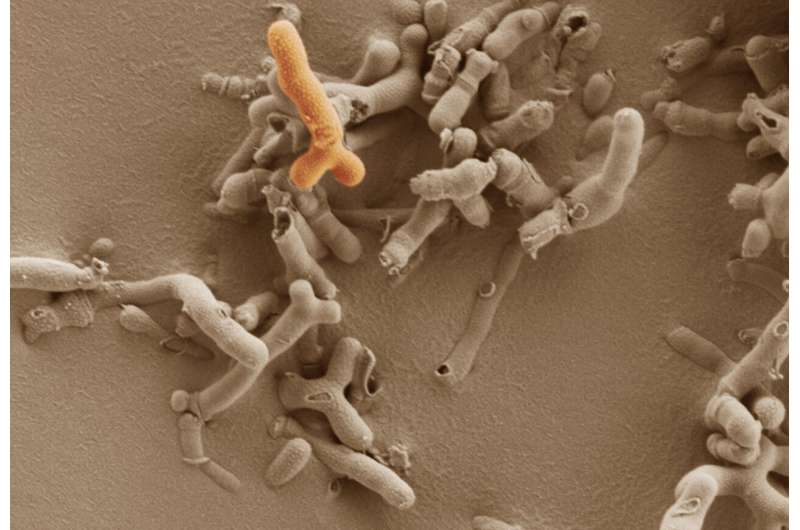This article has been reviewed according to Science X's editorial process and policies. Editors have highlighted the following attributes while ensuring the content's credibility:
fact-checked
peer-reviewed publication
trusted source
proofread
Mother's gut microbiome during pregnancy shapes baby's brain development, mouse study finds

A study in mice has found that the bacteria Bifidobacterium breve in the mother's gut during pregnancy supports healthy brain development in the fetus. The results are published in the journal Molecular Metabolism.
Researchers have compared the development of the fetal brain in mice whose mothers had no bacteria in their gut, to those whose mothers were given Bifidobacterium breve orally during pregnancy, but had no other bacteria in their gut.
Nutrient transport to the brain increased in fetuses of mothers given Bifidobacterium breve, and beneficial changes were also seen in other cell processes relating to growth.
Bifidobacterium breve is a 'good bacteria' that occurs naturally in our gut, and is available as a supplement in probiotic drinks and tablets.
Obesity or chronic stress can alter the gut microbiome of pregnant women, often resulting in fetal growth abnormalities. The babies of up to 10% of first-time mothers have low birth weight or fetal growth restriction. If a baby hasn't grown properly in the womb, there is an increased risk of conditions like cerebral palsy in infants and anxiety, depression, autism, and schizophrenia in later life.
These results suggest that improving fetal development—specifically fetal brain metabolism—by taking Bifidobacterium breve supplements while pregnant may support the development of a healthy baby.
"Our study suggests that by providing 'good bacteria' to the mother we could improve the growth and development of her baby while she's pregnant," said Dr. Jorge Lopez-Tello, a researcher in the University of Cambridge's Center for Trophoblast Research, first author of the report.
He added, "This means future treatments for fetal growth restriction could potentially focus on altering the gut microbiome through probiotics, rather than offering pharmaceutical treatments—with the risk of side effects—to pregnant women."
"The design of therapies for fetal growth restriction are focused on improving blood flow pathways in the mother, but our results suggest we've been thinking about this the wrong way—perhaps we should be more focused on improving maternal gut health," said Professor Amanda Sferruzzi-Perri, a researcher in the University of Cambridge's Center for Trophoblast Research and senior author of the report, who is also a Fellow of St John's College, Cambridge.
She added, "We know that good gut health—determined by the types of microbes in the gut—helps the body to absorb nutrients and protect against infections and diseases."
The study was carried out in mice, which allowed the effects of Bifidobacterium breve to be assessed in a way that would not be possible in humans—the researchers could precisely control the genetics, other microorganisms and the environment of the mice. But they say the effects they measured are likely to be similar in humans.
They now plan further work to monitor the brain development of the offspring after birth, and to understand how Bifidobacterium breve interacts with the other gut bacteria present in natural situations.
Previous work by the same team found that treating pregnant mice with Bifidobacterium breve improves the structure and function of the placenta. This also enables a better supply of glucose and other nutrients to the developing fetus and improves fetal growth.
"Although further research is needed to understand how these effects translate to humans, this exciting discovery may pave the way for future clinical studies that explore the critical role of the maternal microbiome in supporting healthy brain development before birth," said Professor Lindsay Hall at the University of Birmingham, who was also involved in the research.
While it is well known that the health of a pregnant mother is important for a healthy baby, the effect of her gut bacteria on the baby's development has received little attention.
More information: Jorge Lopez-Tello et al, Maternal gut Bifidobacterium breve modifies fetal brain metabolism in germ-free mice, Molecular Metabolism (2024). DOI: 10.1016/j.molmet.2024.102004



















